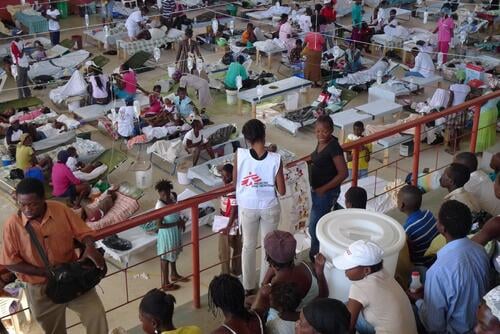Between October 22 and December 5, Medecins Sans Frontieres (MSF) treated more than 51,000 people with cholera symptoms in Haiti, including 1,100 every day over the past week. MSF currently runs 40 treatment facilities throughout the country with a total capacity of about 3,300 beds.
The situation is particularly critical in the north of the country, where the epidemic has spread over the last two weeks. MSF teams are running cholera treatment centres (CTC) in the cities of Cap Haitien and Port-de-Paix. In the north, MSF is receiving 380 patients daily, including 200 in Cap Haitien where 300 patients are currently hospitalised. In Port-de-Paix, in the northwest, more than 100 patients are being admitted every day and MSF has increased its hospitalisation capacity to reach 130 beds.
“We often see only the tip of the iceberg as we know there are people who are dying from cholera in the rural communities,” said David Schrumpf, who leads the MSF outreach teams in the north. “We are trying to reach them by car, motorbike, or sometimes by foot, to install oral rehydration points and treatment units. Our objective is to provide the more remote populations with a better access to medical care but also to let sick people rehydrate on the way to the first health structures.”
In the capital, Port-au-Prince, the number of cholera cases remains high but, globally, the number of admissions to the 13 MSF treatment facilities is stabilising. In total, 14,000 people have been treated, including 1,800 this past week, in the Haitian capital city. In the Artibonite, where the epidemic started eight weeks ago, the number of cholera patients is decreasing: 870 over the last seven days, for a total of 21,000 patients.
MSF teams remain on alert and monitor the epidemiological situation in the country in order to better adapt their activities. Following an increase in cholera cases in several areas of the country’s south, MSF is conducting assessments and is putting in place cholera treatment facilities. It is the case notably in Leogane and Jacmel (South), and in Les Cayes and Jeremie (South-West).
“In areas newly affected by the disease, the population of areas is really scared,” said Alan Lefebvre, MSF emergency coordinator. “The population fears that a cholera treatment centre will bring the disease to the community. The challenge is to inform, to raise awareness, and to demonstrate that we are there to treat the sick and that this is working.”
More than 4000 Haitian workers are working alongside 260 expatriates in response to the cholera epidemic in Haiti. MSF has brought more than 770 tons of medical and logistical supplies into the country to respond to the outbreak.




